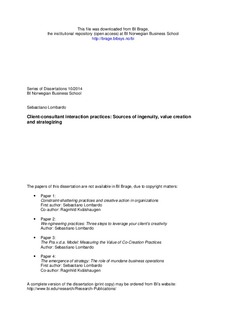Client-consultant interaction practices: Sources of ingenuity, value creation and strategizing
Doctoral thesis
Permanent lenke
http://hdl.handle.net/11250/218998Utgivelsesdato
2014Metadata
Vis full innførselSamlinger
Sammendrag
Service providers increasingly choose to interact with their clients. Previous studies show that client’s resources and activities can influence the service provider’s ability to create value, to be creative, and to develop competitive strategies. Yet several gaps can be identified in the literature regarding how these abilities are impacted by client-consultant interaction (c-c-i) practices. The purpose of this doctoral thesis is to explain the service providers’ varying ability to offer highly valuable solutions to their clients’ problems, in terms of the practices through which consultants interact with their clients. The main research questions are;
How do client-consultant interaction practices influence a firm’s ability to offer unique value propositions and deliver ingenious solutions, and how do these practices influence the formation of the firm’s strategy? These questions are answered through four papers. Each paper answers a sub-question.
Paper 1 focuses on the impact of c-c-i practices on the service providers’ ingenuity capabilities. The paper asks how project teams shatter constraints in ill-structured problem-solving situations, and what implications this finding has for the understanding of creative action in organizations. This paper sheds light on the c-c-i practices through which project teams shatter their constraints and create ingenious solutions.
Paper 2 focuses on the creative aspects of c-c-i practices and presents the experiences of service providers who have been successful in capitalizing on the creative resources provided by their clients.
Paper 3 is an inquiry into the relationship between c-c-i practices and the service providers’ ability to offer unique value propositions. The paper provides a model to define and assess value created through c-c-i practices. The findings of this paper show that value creation is maximized through c-c-i practices that provide access to various forms of capital and practice that enable capital exploitation. Unique value offerings can be developed from knowing what c-c-i practices to enact in different circumstances.
Paper 4 focuses on the implications of c-c-i practices for the emergence of new strategies. The findings show that mundane business operations can be the locus of strategizing, and that clients can play a role in emergent strategy formation. Theoretical resources for this research are drawn from literature on practice theory, strategy, organizational creativity, and value creation. An explorative research design is used and qualitative data are gathered from 30 cases through extensive field work. Both in-depth and comparative case analyses are performed.
